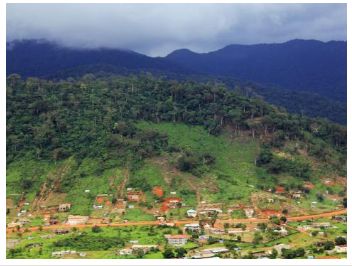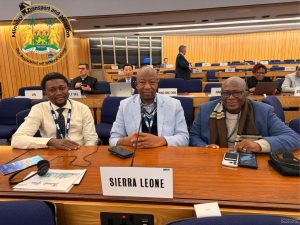Collaborative Efforts Essential to Combat Environmental Degradation in Sierra Leone
Abdul Rahman Bah

Sierra Leone is grappling with severe environmental degradation, primarily driven by deforestation and human encroachment into green belt areas. These activities have profound implications for the country’s ecological balance, biodiversity, and the well-being of its citizens.
Historically, Sierra Leone’s forests have been vital for maintaining ecological stability. However, they are under relentless pressure from agricultural expansion, urbanization, logging, and wood harvesting for fuel. Unchecked human activities threaten protected areas, including forests and green belts, which are essential for buffering against natural disasters and preserving ecological integrity.
The loss of forest cover drastically increases the risk of flooding. Trees and vegetation play a crucial role in water absorption and help slow down rainfall, reducing immediate runoff. Without them, rainfall strikes the ground directly, overwhelming drainage systems and leading to flash floods, particularly in urban areas like Freetown. This has resulted in significant loss of life, property destruction, and economic setbacks.
Moreover, deforestation contributes to global warming. Trees act as carbon sinks, absorbing carbon dioxide. When they are removed, not only is this carbon storage lost, but the carbon stored in trees is also released back into the atmosphere, exacerbating climate change.
Forests maintain a delicate balance in the water cycle, regulating the absorption and release of water. Their removal disrupts this balance, leading to reduced rainfall and the drying up of rivers and groundwater. As deforestation persists, droughts become more frequent, adversely affecting agriculture and diminishing the availability of clean water.
Deforestation also leads to soil erosion, resulting in the loss of topsoil essential for agriculture. This reduction in land fertility threatens food security and economic stability, particularly in a country where agriculture is a cornerstone of the economy.
Sierra Leone’s forests host diverse plant and animal species, many of which are endemic or endangered. Deforestation destroys these habitats, leading to biodiversity loss and threatening the survival of numerous species. This loss disrupts ecosystems that local communities rely on for food, medicine, and resources.
Green belts, designated for environmental protection in urban areas, face encroachment as cities expand. This undermines their protective role against environmental degradation and hinders sustainable urban growth.
The degradation of the environment has lasting economic and social consequences. In rural regions, diminished agricultural productivity increases poverty levels, while in urban areas, the loss of green spaces contributes to health issues and greater vulnerability to natural disasters.
Addressing these pressing environmental challenges necessitates a multi-faceted approach. This includes implementing sustainable practices to mitigate deforestation, protecting green belt areas, and promoting biodiversity conservation. Collaborative efforts among government agencies, local communities, and international organizations are essential to safeguard Sierra Leone’s natural heritage and ensure a sustainable future for its citizens.





